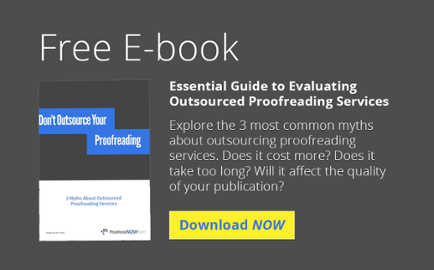 As a writer, you need to trust your editors and proofreaders, but you should still spend at least some amount of time polishing your writing before handing it over to them. Sure, this makes things somewhat easier for your proofreaders, but it also ensures clearer, better writing overall.
As a writer, you need to trust your editors and proofreaders, but you should still spend at least some amount of time polishing your writing before handing it over to them. Sure, this makes things somewhat easier for your proofreaders, but it also ensures clearer, better writing overall.
Do you have a clear review process that you follow before passing your work along to your proofreaders or editors? If not, here are a few things to consider if you want your writing to be the best it can be before giving it to someone else to edit.
Organize Your Writing
Some writers create an outline before they start writing, while others don’t. But it’s clear that well organized writing is better for readers. Whether you complete a detailed outline or a simple bulleted list, it’s important to organize your writing in some way to ensure that the ideas expressed in it flow in a consistent and coherent manner.
You can organize your writing before you write or after you write. Either way, be sure to verify that sentences, paragraphs, and chapters flow in a meaningful and coherent sequence. If needed, create a table of contents for your work to keep it organized as you write. Also, be sure to include an organized index, appendix, or glossary for work that requires detailed research and footnotes. Adding to and fleshing out indexes, appendices, and glossaries as you write will help you keep your writing organized.
Re-Confirm Your Audience and the Intention of Your Writing
As you write, keep your intended audience at the forefront of your mind. Be sure that the context of what you’re writing is geared toward their concerns and interests. And when you review your writing, be sure to reword, rephrase, and reorganize portions of your writing that seem to veer away from their perspectives and what they care about.
Polished writing doesn’t waver in its focus or perspective. It doesn’t speak to lawyers one moment and then the public-at-large the next, for example. Instead, it speaks directly to its intended audience and what they care about most. And it’s centered around what they want to read about.
Double-Check the Formatting of Your Writing
Make sure that your format is easy to read and understand. Before sharing your work with an editor or proofreader, make sure that:
- the fonts you’ve used are consistent and legible,
- your spacing isn’t warped,
- all your margins are formatted properly and consistently,
- your work is at least legible and coherent,
- embedded images and media are usable and formatted properly, and
- your headers and sub-headers are accurately placed.
Another important issue is to make sure that the file format you’re using is easy to access and download and that your editor or proofreader will easily be able to save it and make changes to it. It’s surprising how many documents are corrupted or inaccessible due to improper formatting issues.
Follow an Editing & Proofreading Checklist as You Review Your Writing
Once you’re confident that your writing is well-organized, geared toward your intended audience and what they care about, and that it’s formatted properly, you can follow an editing and proofreading checklist as you review your work. Briefly skim your work and double-check it for errors on your list, especially those errors that are glaring and stand out.
An editing and proofreading checklist will likely require you to check for most of the following in your writing as you review it:
- Grammar and spelling errors
- Paragraph length and each paragraph’s level of detail
- Consistency and parallel structure
- Comprehensiveness
- Accuracy of facts, data, and resources
Understand What Your Editor or Proofreader Will Review and Fix and What They Won’t
Before you start to cut and polish your writing, it’s important to understand what editors and proofreaders do, as well as what they don’t do. Otherwise, all parties involved may end up frustrated and wasting a lot of valuable time.
It’s important to understand that editors and proofreaders aren’t ghostwriters. They will recommend necessary revisions to your work that you will have to make, but they will not write or alter significant chunks of your work on your behalf. They are also working to make sure that your writing is as clear and as well-written as possible, and they want it to succeed.
For more details and insight, read Editor or Proofreader: Who Does What?, What Every Proofreader Needs You to Know, and Common Myths About Proofreaders, Debunked.
***
Do you have a clear and documented review process before you submit your writing to editors or proofreaders? Share it with us in the comments below and join the conversation.




